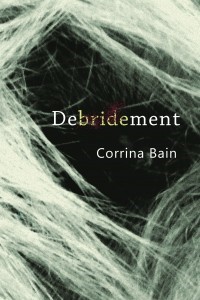98 pages, $16.00
Review by Jay Besemer
One risk with the personal review is that one’s own experience insists on taking up space in a conversation about someone else’s work. But a book like Corrina Bain’s first full-length poetry collection Debridement demands a greater degree of transparency and subjectivity in a reviewer. So here’s my little bit of space in this conversation: I am a transgender man, moving through a “transition” that will actually continue through the rest of my life, as my middle-aged, chronically ill body continues to work with the testosterone that has saved me. I experience and write about Debridement from that highly embodied, complexly irreducible subject position. It is not the same position as Bain’s gender non-conforming one, and that also needs saying, because these nuances of position are at once subtle, mobile, difficult to navigate and vitally important.
This means I am not the same reading (or writing) person I used to be. My previous version would have been uncomfortable weighing in on a book whose violence is both unapologetic and necessary. For that’s what Bain’s book is—violent and necessary, and violent by necessity. I’m not talking about the violence of content, though there is that kind of violence in these poems. I’m talking about a surgical violence. A radical, invasive disruption of one’s person and body for healing purposes. Only here, the poet is not telling readers about a healing trauma (or about healing from trauma). In Debridement, Bain is both holding the knife and under it. He is cutting away his own dead parts as well as ours. And make no mistake: we need this.
In “Wound Seduction Manual” (there are two poems called this) Bain grafts language from a heterosexual “guy’s guide to getting it on” onto medical text describing phalloplasty. The results are both hilarious and chilling:
you can see the process starting immediately
a saline-moistened dressing
is allowed to dry and
adhere then pulled off without hesitation
the dressing can stick to living tissue as well
to get her all fluttery-eyed and laughing
and opening up to you
and
With this book you’ll have the confidence
and charm to walk up to any girl anywhere
and construct the functional
and cosmetically acceptable penis.
Recombining these texts exposes the connective tissue of gender toxicity that creates and supports them in the first place. These two “manuals” (the poems) powerfully question who defines the “cosmetically acceptable penis,” and filet all assumptions about its “function”—specifically, assumptions about how it’s to be used, by and with whom. But we can go a little deeper here, too, because these two poems also challenge preconceptions about gender-nonconforming or trans bodies. Who has the right to define and determine what another’s body must have, do or look like in order to claim a particular (or no particular) gender or genders? Bain’s source texts are relics of a time—not so far in the past—when various self-appointed authorities claimed the right to define and pass judgment on bodies they were desperate to regulate. Oh wait—we still live in such a time. My bad.
This is why we need the verbal debridement of Corrina Bain’s poems. We are harmed, each and every one of us, by the septic deadweight of internalized ideas about race, gender, sexuality. You can see it on the streets, in homes and institutions, on social media. These are ideas we can’t help but carry within us, are forced to live with, and often cost us our lives. In “Uterine,” Bain pulls aside the flesh curtain of shame and silence to expose something few can put into words:
Laboring through her bloody tenure
flanked by a hormonal retinue
she’s center stage, the muscular tureen
that keeps me from my maleness, from neuter.
[…]
How [to] reunite
the cave-dwelling best with the sharp tine
of my human purpose, if she is what’s true?
In these lines, the ghostly voice of doom bullies or wheedles in the background, insisting that the truth is limited and defined by the flesh we are born in. This voice corroborates the claims of those who say a person is always and only defined by others—that some external authority is entitled to tell you what you are and act upon you to make you conform to that decree. Bain knows a deeper, more complex and terrifying truth. “Uterine” masterfully riffs on and reshuffles the letters of the word in its title, ending each line with a variation. Say its quoted lines aloud and you’ll taste the near-rhyme. Perhaps such a patently transgressive message needs a formal constraint to concentrate its power into a lasering tongue. I’ve read “Uterine” twenty or thirty times. I’ve never had another poet speak from inside my body to that extent, so clearly, so forcefully, with what I can only describe as brutal kindness. I wish I’d written that poem, but that isn’t where my hands travel.
Buy Debridement. Read it, fight with it, love it. Give it to people you care about. You need it. We all do.
***
Jay Besemer is the author of several poetry collections. His critical essays appear in many publications, including Rain Taxi Review of Books, ENTROPY and The Volta. He is currently guest-editor, with Joel Allegretti, for a special issue of Nerve Lantern: Axon of Performance Literature. He tweets @divinetailor.
![[PANK]](https://pankmagazine.com/wp-content/themes/pank/assets/images/pank-logo-large.png)

